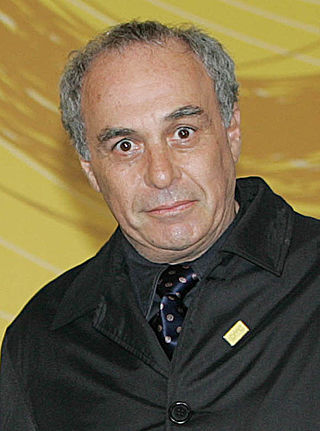
Maria do Carmo Miranda da Cunha, known professionally as Carmen Miranda, was a Portuguese-born Brazilian singer, dancer, and actress. Nicknamed "The Brazilian Bombshell", she was known for her signature fruit hat outfit that she wore in her American films.

The Three Caballeros is a 1944 American live-action and animated musical propaganda anthology film produced by Walt Disney and released by RKO Radio Pictures. The film premiered in Mexico City on December 21, 1944. It was released in the United States on February 3, 1945 and in the United Kingdom in March 1945. It marks the tenth anniversary of Donald Duck and plots an adventure through parts of Latin America, combining live-action and animation. This is the second of the six package films released by Walt Disney Productions in the 1940s, following Saludos Amigos (1942). It is also notable for being one of the first feature-length films to incorporate traditional animation with live-action actors.

Stefan Zweig was an Austrian writer. At the height of his literary career, in the 1920s and 1930s, he was one of the most widely translated and popular writers in the world.

Héctor Eduardo Babenco was an Argentine-Brazilian film director, screenwriter, producer and actor who worked in several countries including Brazil, Argentina, and the United States. He was one of the first Brazilian filmmakers to gain international critical acclaim, through his films which often dealt with social outcasts on the fringes of society. His best-known works include Pixote (1980), Kiss of the Spider Woman (1985), Ironweed (1987), At Play in the Fields of the Lord (1990) and Carandiru (2003).

The nineteenth edition of the South American Championship in football was held in Buenos Aires, Argentina from 12 January to 10 February. This tournament, an extra edition with no trophy handed to the winners, is considered official by CONMEBOL.

Ary Evangelista de Resende Barroso was a Brazilian composer, pianist, soccer commentator, and talent-show host on radio and TV. He was one of Brazil's most successful songwriters in the first half of the 20th century. Barroso also composed many songs for Carmen Miranda during her career.

Ivan Tors was a Hungarian playwright, film director, screenwriter, and film and television producer with an emphasis on non-violent but exciting science fiction, underwater sequences, and stories involving animals. He started a Miami-based film studio now known as Greenwich Studios, and later a music company.
In art, neorealism refers to a few movements.

The Cisplatine War was an armed conflict fought in the 1820s between the Empire of Brazil and the United Provinces of the Río de la Plata over control of Brazil's Cisplatina province. It was fought in the aftermath of the United Provinces' and Brazil's independence from Spain and Portugal, respectively, and resulted in the independence of Cisplatina as the Oriental Republic of Uruguay.

Alberto de Almeida Cavalcanti was a Brazilian-born film director and producer. He was often credited under the single name "Cavalcanti".

Marieta Severo da Costa is a Brazilian stage, film and television actress. She is best known to youth audiences as the archetypal mother figure in popular sitcom A Grande Família (2001–2014), as well to mature audiences for portraying villains in telenovelas.

Copacabana is a 1947 American musical comedy film directed by Alfred E. Green starring Carmen Miranda, Groucho Marx and Steve Cochran. The film is a showcase for Miranda, who performs several numbers in her usual style, including a high-energy rendition of "Tico-Tico". Groucho, as Lionel, her fiance and agent, also sings a musical number, "Go West, Young Man", wearing his traditional greasepaint brows, mustache, and baggy suit. This was Groucho's first significant film appearance as a solo act, minus Harpo and Chico.

The Cinemateca Brasileira is the institution responsible for preserving Brazilian audiovisual production. In July 2021, it experienced a major fire.

Júlio Eduardo Bressane de Azevedo is a Brazilian filmmaker and writer.

Events in the year 1943 in Brazil.

Events in the year 1946 in Brazil.

The Thrill of Brazil is a 1946 American musical comedy film directed by S. Sylvan Simon and starring Evelyn Keyes, Keenan Wynn, and Ann Miller. It was produced and distributed by Columbia Pictures. Simon was loaned out from MGM to direct the film.

Rogério Sganzerla was a Brazilian filmmaker. One of the main names of the cinema marginal underground movement, his most known work is The Red Light Bandit (1968). Sganzerla was influenced by Orson Welles, Jean-Luc Godard, and José Mojica Marins, and often used clichés from film noir and pornochanchadas. Irony, narrative subversion and collage were trademarks of his film aesthetics.

















